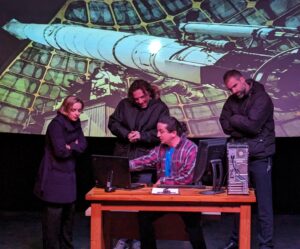Sympathetic Magic, by Lanford Wilson.
Directed by John Sowle.
Reviewed by J. Peter Bergman.
“I’m not quite in your league, but I’m getting there.”
Lanford Wilson’s neglected 1997 play “Sympathetic Magic” is getting a fine production with an excellent cast at Bridge Street Theatre in Catskill, New York, home of often forgotten plays that need to be seen. This is a perfect example of how that theory works. Originally produced off Broadway in 1997 and, though it won an OBIE Award for playwrighting, it closed after only 38 performances, making it one of Wilson’s rare flops. It has rarely been revived. After its production Wilson moved out of New York City’s Greenwich Village to live thereafter in Sag Harbor. He never had a new play in New York again.

It is an intriguing look at intellectuals, artists and astrophysicists in San Francisco in the
era of AIDS. The eight characters each have something “in the works” and everyone of them has
a lot to say about life, relationships and the miracles of discovery. Andy Anderson and Mickey
Picco have discovered something in the cosmos in the distant past which could change
perceptions about the development of mankind. Don Walker, an Episopalian priest, has found a
religious parallel to their discovery. His half sister Barbara, a sculptor, has found a new reality in
her own body. Their mother, Liz, has found a meaning for happenstance, a literal Sympathetic
Magic, an instance of life imitating art.
What director John Sowle has done here is to bring out truths in such a way as to instill those facts with lives of their own, outside the physical limits of the characters who encompass them. As each story plays out the people involved become more real and honest than characters ordinarily would
do. Just like the simple portraits in Tennessee Williams’ plays the realized people in this play cannot
hide behind the author’s brilliant dialogue. They are forced to reveal themselves without artifice. We find them complete and honest, even in the roughest moments of their lives.
Andy, who has the roughest challenges, is played by Brian Sheppard. An eager soul with a large secret loses what little “cool” he possesses and lives to regret it. This is a difficult role and Sheppard handles it masterfully, even when Sowle’s direction brings him to hateful violence.
As his girlfriend, Barbara, Molly Parker Myers takes the challenge of violence and its aftermath with a beautiful strength. Her reaction is very memorable indeed.
Seth McNeil plays her religious brother who cannot keep his ideals alive in his work. He brought me close to tears at one point in the second act.
Their mother, anthropologist Liz Barnard, was played by Terry Sidell whose soft-spoken lines were often difficult to hear. However her explanation of the title concept was loud and clear and made the play more than just a play.
Nico Ager played Mickey, a man whose relationships were often one step beyond reality for me. He played the role so well that he garnered both sympathy and understanding.
Pauly Scott, a chorus master, was played with humor and charm by Timothy Dunn and he often brought Wilson’s comedic writing to the fore.
Liz’s assistant, a romantic wanna-be, was played perfectly by Abby Burns. This is a character who manages to be exactly where she needs to be all of the time and she was very believable in the role.
Finally, Steven Patterson played Andy and Mickey’s boss, the Head of the Department and he delivered the role tied up with a bow, perfectly wrapped and wrought with honesty and the despair found in academic circles. It was basically a perfect cast.
This opportunity, to see a play long missing from the Lanford Wilson lexicon, reopens the man’s vision of the world and how to deal with it, both in his own time and in our own. The author has taken on deep issues of honesty, discovery and trust. When his characters resort to violent decisions they must become physical and they do. When he finds humor in a situation we follow in his tracks and laugh at the ways in which these people express themselves. When love is an issue, human nature grabs the moment and takes it where it desperately needs to go, even if that destination is unreachable. Wilson is a great writer and he proves it in this play which Bridge Street Theatre has offered us.
Sowle’s set design keeps the play moving and Carmen Borgia’s lights and sound keep us
grounded in reality. Michelle Rogers’ costumes help to give the characters their individuality and reality.
I would make it a point of honor, if you love theater, to see this show. Missing it, because you’ve never heard of it, would be a great mistake. It is not an easy play and you may not get each and every point on a single viewing, but you will get enough of it to understand what Wilson wanted you to
know, understand, and appreciate. It is that kind of experience.
Sympathetic Magic runs through November 19 at Bridge Street Theatre, 44 W. Bridge
Street, Catskill, NY. For tickets or information: 518-943-3818 or BridgeStreetTheatre.org


